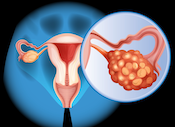Behind the headlines: endometriosis and ovarian cancer
This piece has been reproduced with permission from Endometriosis UK.
You may have seen endometriosis in the news this week in relation to research on ‘Endometriosis and Ovarian Cancer’ published by the Journal of the American Medical Association (JAMA) [1].
Some news articles have claimed that the research highlights those with endometriosis are at ‘increased risk’ of ovarian cancer, despite associate professor Karen Schliep, University of Utah and senior author of the study, stating that
given the rarity of ovarian cancer, the excess risk was relatively small.
 Experts we have spoken to in the UK and USA also have questions about the study’s methods and the data used to draw their conclusions.
Experts we have spoken to in the UK and USA also have questions about the study’s methods and the data used to draw their conclusions.
Our key message is that ovarian cancers are rare; if you have endometriosis there is a slight increased risk of ovarian cancer and it is good to be aware of symptoms of ovarian cancer.
Speak to your doctor if you have any concerns!
There’s been research out for a long time that indicates a small excess risk of ovarian cancer if you have endometriosis; in the general population the risk is 1.3%, and for those with endometriosis the risk is 1.8%[2]. The new JAMA paper suggests that the figure is higher than this, but this may not necessarily be the case.
A flawed methodology?
The JAMA paper is based on an analysis of 450,906 women from the US state of Utah among whom 597 were diagnosed with ovarian cancer. Whilst this sounds like a lot of people to survey, it’s a study of a single population in a single US state. To ensure that findings are generalisable globally, and not reflecting a local situation, research would need to be across more diverse populations globally.
As you will very probably know, getting a diagnosis of endometriosis can take a long time – the average in the UK is almost 9 years [3]. We also know that some never even get a diagnosis, with symptoms put down to other conditions, dismissed, or not believed. This would result in some people who do have endometriosis (undiagnosed) being included in the ‘no endometriosis’ group in this new study, skewing the statistics and artificially inflating the risk to those with endometriosis.
Furthermore, the data used was from 1992 to 2019, with a diagnosis of endometriosis taken from the coding (called “ICD”) of medical records. According to researchers in the US, back in 1992 it is likely that only surgeons would use these codes, and that anyone with endometriosis being managed by their GP/family doctor (e.g. with hormones and pain management, not surgery) would not be coded. If that’s the case, the statistics would again be skewed and artificially inflate the risk, as many with endometriosis would be included in the ‘no endometriosis’ group.
It would be great to see more research into endometriosis and to get answers to the many questions the endometriosis community have.
Am I going to get ovarian cancer?
This is an excerpt from The Lancet on how to inform those with endometriosis about ovarian cancer risk [2]
- Most women with endometriosis never develop ovarian cancer. Although several studies report an increased ovarian cancer risk, evidence suggests that the overall likelihood of you developing ovarian cancer is low. Thus, you should be aware of, but not worried about, the effect of endometriosis on your ovarian cancer risk.
- Although 1·3% of women in the general female population will develop ovarian cancer in their lifetime, this proportion is still less than 2% in women with endometriosis. Thus, although the risk is increased, your lifetime risk is low and is not substantially different from that in women without endometriosis.
To put the risk in perspective, according to recent estimates, 39% of women who inherit a harmful BRCA1 mutation and 11–17% who inherit a harmful BRCA2 mutation—the rare genes that predispose to breast cancer—will develop ovarian cancer by 70 years of age. Furthermore, as a woman in the general population, your risks of breast (12%), lung (6%), and bowel (4%) cancers are still higher than your risk of developing ovarian cancer.
- Certain types of ovarian cancer are more commonly associated with a history of endometriosis. These endometriosis-associated cancers tend to be detected at an earlier stage and have a better prognosis than other types of ovarian cancer.
Symptoms of ovarian cancer
This is an excerpt from the NHS website [4]
Symptoms of ovarian cancer include frequently (roughly 12 or more times a month) having:
- a swollen tummy or feeling bloated
- pain or tenderness in your tummy or the area between the hips (pelvis)
- no appetite or feeling full quickly after eating
- an urgent need to pee or needing to pee more often
Other symptoms of ovarian cancer can include:
- indigestion
- constipation or diarrhoea
- back pain
- feeling tired all the time
- losing weight without trying
- bleeding from the vagina after the menopause
Please be aware that these symptoms are very common and can be caused by many different conditions.
But it’s still important to get them checked by a doctor. This is because if they’re caused by cancer, finding it early can mean it’s more treatable.
References
- Barnard M, et al. Endometriosis typology and ovarian cancer risk. JAMA 2024 online ahead of print
- Kvaskoff M, et al. Informing women with endometriosis about ovarian cancer risk. Lancet 2017;390:2433-34
- Endometriosis UK diagnosis report, March 2024
- NHS – Ovarian cancer [accessed 19 July 2024]






